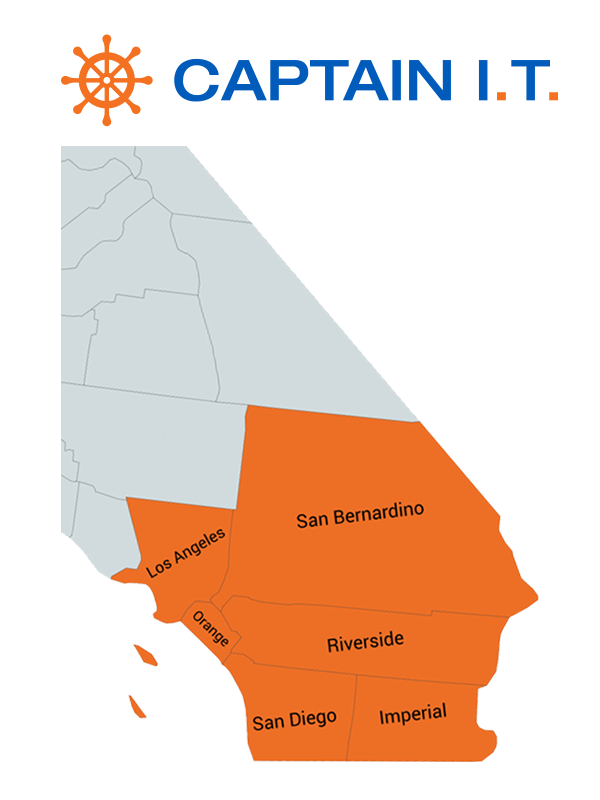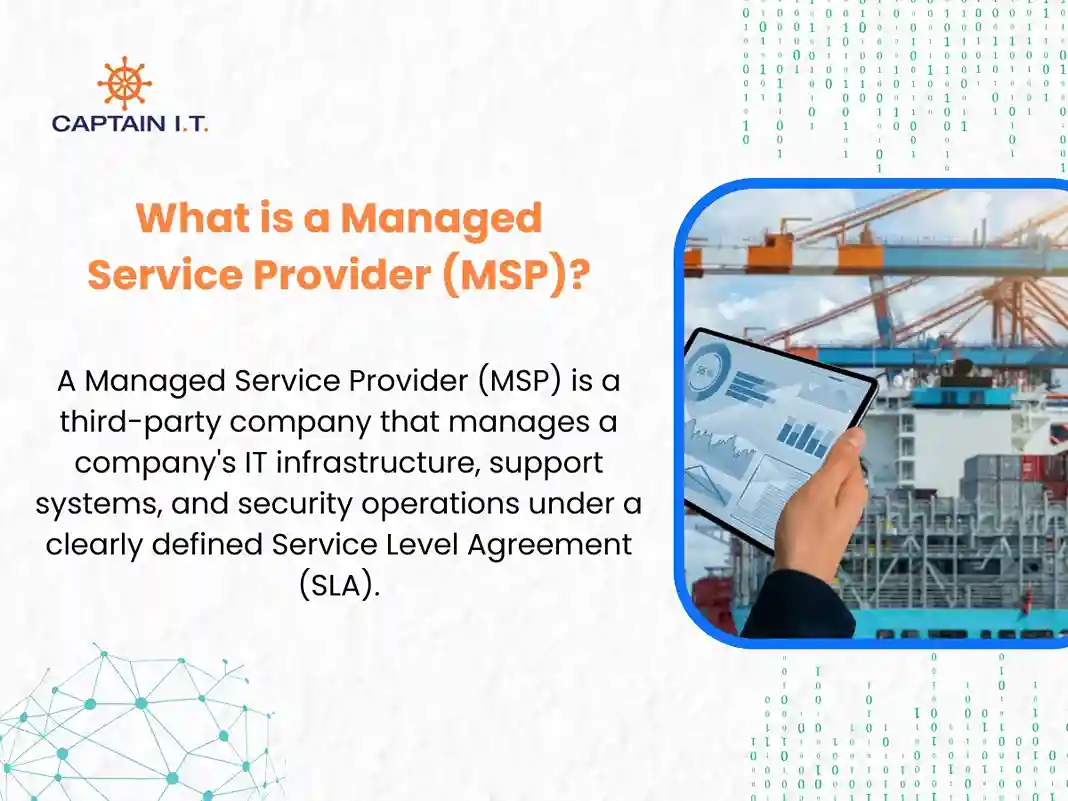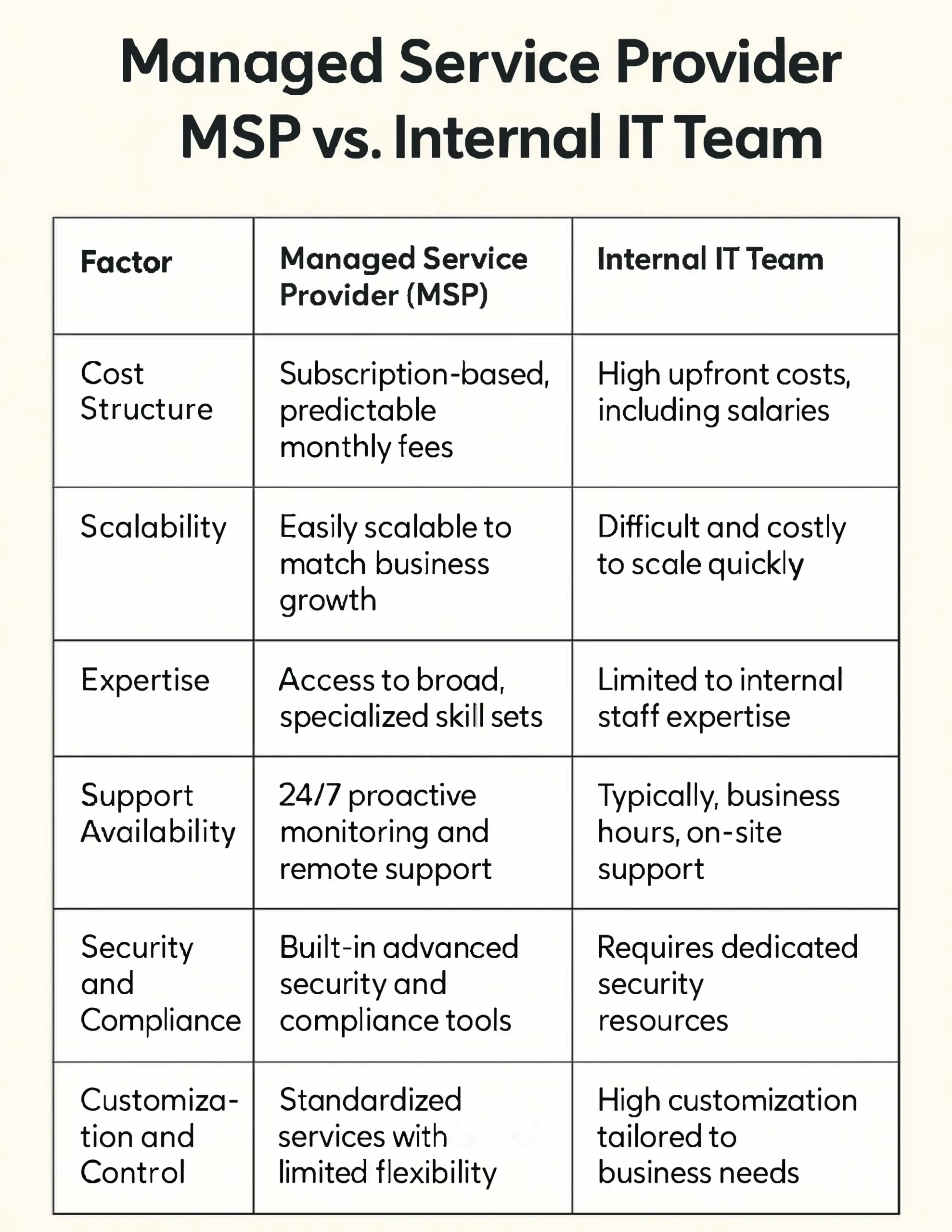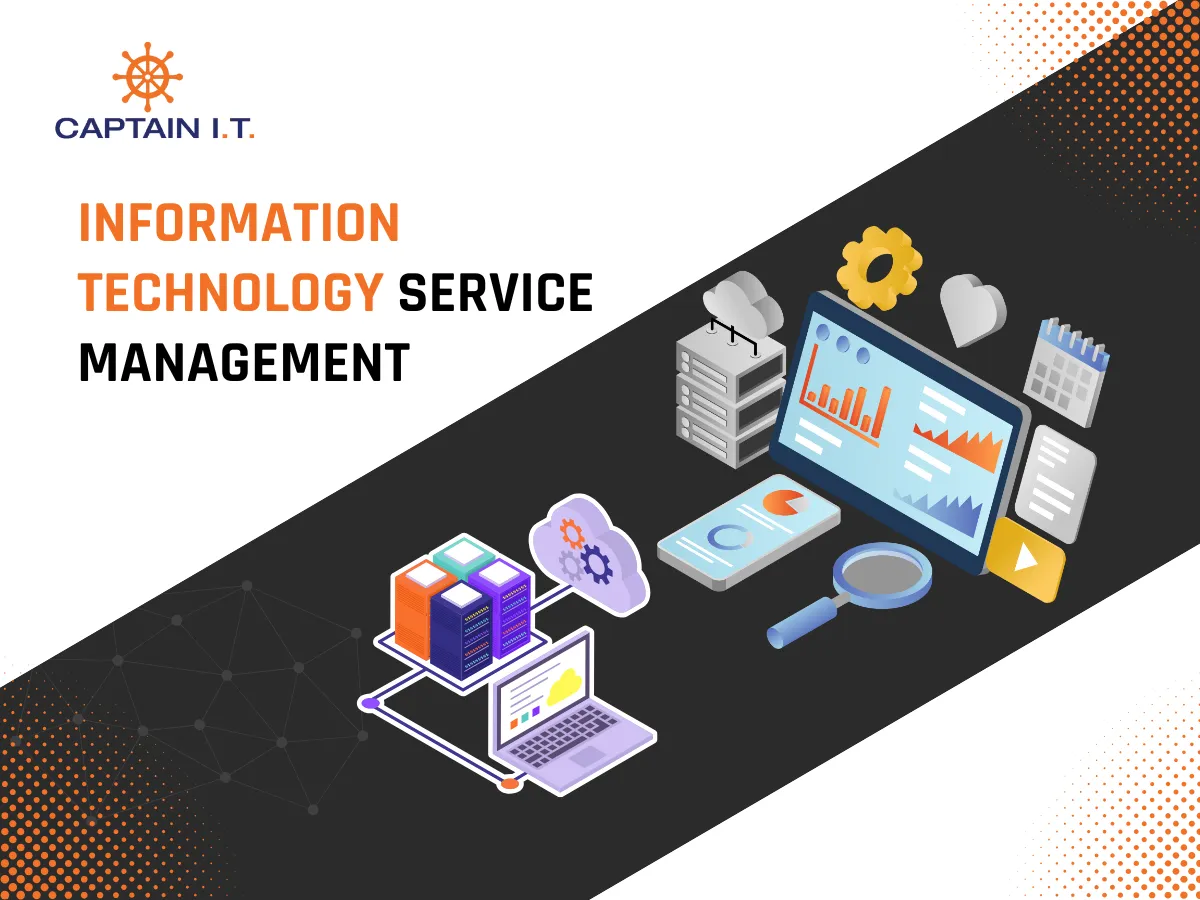Managed IT Services Los Angeles, CA
Since 2010, Captain IT has been a reliable managed IT services provider (MSP) in Los Angeles, offering comprehensive IT solutions for businesses of all sizes. Whether you’re seeking proactive IT management, quick-response support, or a full IT infrastructure upgrade, our Los Angeles managed IT services are tailored to ensure your business operates smoothly and securely.
We offer a complete IT service model, ensuring businesses in Los Angeles receive comprehensive IT support, robust cybersecurity, and customized cloud services. With clear pricing, no onboarding fees, and flexible contracts, our IT solutions are designed to help small to mid-sized businesses (SMBs) and mid-market companies maintain smooth IT operations and achieve long-term stability.
As your trusted IT partner, Captain IT handles the complexities of IT management, so you can concentrate fully on your business growth. Our expertise ensures your IT infrastructure stays optimized, secure, and aligned with your business objectives, while our affordable and flexible services offer the scalability businesses need for efficient growth.
Choose Captain IT as your managed service provider in Los Angeles, and learn how our comprehensive IT solutions can improve efficiency, safeguard your operations, and offer peace of mind.
Awards and Certifications
About Captain IT: Los Angeles MSP
Captain IT has been delivering managed IT services in Los Angeles since 2010, supporting both public and private businesses. As an outsourced IT solutions provider, we serve clients across various industries where reliable IT support is crucial for smooth business operations. We offer dependable IT solutions and support to businesses in Los Angeles, helping them achieve their business goals. Our history reflects a strong commitment to building long-term partnerships with clients by delivering dependable, professional, and friendly managed IT services in Los Angeles. Whether you’re a small business or an expanding enterprise, we’re dedicated to ensuring technology helps in your business growth.

SERVICES
Why Choose Captain IT As Your Managed IT Solutions Provider in Los Angeles?
Choose Captain IT for managed IT services in Los Angeles, offering cost-effective, customized solutions for businesses of all sizes. With our local expertise, we provide quick, community-focused support, while our fixed-fee pricing ensures better financial planning with no hidden costs. We focus on proactive maintenance to avoid disruptions, provide strategic consulting to align IT with your business goals, and offer a dedicated team for personalized service. As your comprehensive managed service provider, we handle all your IT needs while meeting agreed SLA standards, allowing you to focus on growth. With a strong focus on customer satisfaction and cost savings, we deliver reliable, high-quality IT services to drive your business towards long-term success.
- Local Expertise
- Proactive Maintenance
- Fixed Fee Costs
- Comprehensive IT Service
- Strategic Consulting
- Customer Satisfaction
- Dedicated Team
- Adherence to SLA
IT SUPPORT SERVICES
IT Services Offered By Captain IT In Los Angeles
Captain IT provides a full range of IT services for Los Angeles businesses, ensuring secure, efficient, and scalable technology solutions, making us the best IT company in Los Angeles.
Our comprehensive IT Services include:
Managed IT Services
Captain IT’s managed IT services model for Los Angeles provides complete IT management solutions for small and medium-sized businesses (SMBs), offering thorough monitoring and maintenance of your IT systems. As a managed IT solutions provider, we deliver proactive monitoring and maintenance to ensure maximum uptime, business continuity, and enhanced operational efficiency with minimal disruption.
Captain IT provides co-managed IT services in Los Angeles, offering the perfect balance of collaboration and expertise for organizations with internal IT teams. Our technical professionals work alongside your IT department, providing access to external resources, tools, and support when needed. This approach empowers your team to build the skills and knowledge required to manage evolving IT challenges without overburdening resources.
Our Los Angeles managed IT support services are designed for businesses of all sizes looking for dependable solutions to technical issues. From emergency support, remote and onsite assistance, to help desk services, we handle everything from hardware failures and software glitches to network connectivity problems. Our dedicated team works to minimize downtime, ensuring your business grows without any disruptions.
Our Managed Cloud Services in Los Angeles offer businesses secure, scalable, and efficient cloud solutions for migration, off-site data storage, and seamless integration. We support Microsoft 365, Microsoft Azure, SD-WAN, Managed DaaS, and Cloud Security, ensuring smooth transitions and optimized cloud environments. These services improve accessibility, collaboration, and data protection, driving business growth and enhancing agility.
Captain IT delivers proactive cybersecurity solutions in Los Angeles, supporting businesses in highly regulated sectors such as healthcare and finance to stay protected. Our security services include secure email encryption, network security, MFA management, endpoint security, vulnerability scanning, and dark web monitoring, all designed to meet HIPAA and PCI-DSS compliance standards. Through advanced risk assessments and industry-leading security measures, we help mitigate cyber threats like malware, phishing attacks, and data breaches, ensuring business continuity and the protection of critical data.
Captain IT’s Managed Network Support in Los Angeles ensures optimized connectivity, secure infrastructure, and efficient network management for local businesses. Our network services encompass everything from design and setup to continuous maintenance, utilizing technologies like Cisco Wi-Fi, Ubiquiti, and Fortinet to maintain smooth operations. Whether you require VOIP systems, structured cabling, or advanced firewall protection, we deliver reliable network performance with minimal interruptions.
Captain IT offers comprehensive IT consulting services to help businesses in Los Angeles optimize their IT infrastructure, improve operational efficiency, and align technology with their strategic goals. Our consulting expertise includes cloud migration planning, IT assessments, and virtual CIO services, ensuring businesses make informed technology decisions. By delivering tailored recommendations for efficiency, compliance, and risk mitigation, we help companies cut costs, boost productivity, and stay competitive in an evolving digital environment.
Captain IT’s Business Continuity Planning Services in Los Angeles deliver resilient strategies to keep your business running during unexpected disruptions. We specialize in data backups, disaster recovery, and risk management to minimize downtime and secure critical assets. Our proactive approach protects against cyber threats, hardware malfunctions, and natural disasters, ensuring uninterrupted operations and long-term business stability.
Our Server Virtualization Services in Los Angeles enable businesses to lower costs and boost performance by running multiple virtual servers on a single physical machine. Our custom virtualization solutions improve resource utilization, scalability, and flexibility, helping businesses streamline their IT infrastructure and adapt to changing operational demands.
For small to medium-sized businesses looking to lower capital expenses, our hardware as a service (HaaS) solutions in Los Angeles provide access to the latest technology and equipment through a convenient monthly subscription. This budget-friendly option enables you to upgrade your IT assets without the need for large upfront investments.
Our Headquarter
Find Captain IT in Los Angeles, CA
Captain IT is conveniently located at 835 Wilshire Blvd, Suite 500, Los Angeles, CA, in the dynamic core of the city. Positioned to serve businesses across Southern California, including Santa Clarita, Burbank, Pasadena, Los Angeles, Glendale, and Long Beach, our office ensures fast and dependable IT support and consulting services for local businesses. Whether you’re nearby or traveling from a key business district, our central location makes it easy to connect with us for all your managed IT needs.
Los Angeles Central Library To Captain IT (Approximately 0.3 Miles)
Head west on W 5th St toward S Flower St. Turn right onto S Flower St, then left onto Wilshire Blvd. Captain IT will be on your right at 835 Wilshire Blvd, Suite 500.
Los Angeles Convention Center To Captain IT (Approximately 1.2 Miles)
Start by heading north on S Figueroa St. Turn left onto Wilshire Blvd. Captain IT will be on your right at 835 Wilshire Blvd, Suite 500.
University of Southern California To Captain IT (Approximately 2.6 Miles)
Begin by heading north on S Hoover St. Turn right onto W 23rd St, then left onto S Figueroa St. Continue on S Figueroa St, then turn right onto Wilshire Blvd. Captain IT will be on your right at 835 Wilshire Blvd, Suite 500.
Dodger Stadium To Captain IT (Approximately 2.5 Miles)
Exit Dodger Stadium onto Vin Scully Ave and merge onto CA-110 S. Take the 6th St exit toward Downtown. Merge onto W 6th St, then turn right onto S Flower St. Turn left onto Wilshire Blvd. Captain IT will be on your right at 835 Wilshire Blvd, Suite 500.
Los Angeles County Museum of Art (Approximately 6.5 Miles)
Head east on Wilshire Blvd from LACMA. Continue straight for approximately 6.5 miles. Captain IT will be on your left at 835 Wilshire Blvd, Suite 500.
Griffith Park To Captain IT (Approximately 8.5 Miles)
From Griffith Park, take Los Feliz Blvd west to N Vermont Ave. Merge onto US-101 S via the ramp to Downtown. Take the exit toward CA-110 S, then take the 6th St exit. Merge onto W 6th St, turn right onto S Flower St, then left onto Wilshire Blvd. Captain IT will be on your right at 835 Wilshire Blvd, Suite 500.
Onboarding
How Our Managed IT Service Model Works?
At Captain IT, we follow a strategic and effective approach to delivering managed IT services that drive success for Los Angeles businesses. With transparent pricing, no onboarding fees, and flexible contracts, we make IT management seamless and stress-free. Here’s how we ensure your IT infrastructure supports your business goals
Onboarding
We begin by gaining a deep understanding of your IT environment and business requirements in Los Angeles. Our onboarding process includes seamless system integration, help desk training for your team, and a comprehensive initial IT assessment, ensuring a strong IT foundation for small and mid-sized businesses.
Detailed Evaluation
Our experts conduct a thorough evaluation of your IT infrastructure in Los Angeles, identifying strengths, weaknesses, and opportunities for enhancement. This assessment allows us to develop a tailored IT strategy that ensures efficiency, security, and scalability.
Strategic Design and Deployment
Based on the assessment, we design and deploy customized IT solutions that align with your business goals in Los Angeles. Our team ensures seamless implementation with minimal disruption, optimizing your IT systems for performance and long-term stability.
Continuous Monitoring and Management
Our job doesn't stop after deployment. We provide continuous monitoring, proactive management, and rapid issue resolution for businesses in Los Angeles, ensuring IT systems remain secure, reliable, and efficient. With our ongoing IT support, local businesses can focus on innovation and productivity without worrying about technical disruptions.
Succeed
Our goal is to support your business's success. With Captain IT's dependable and customized IT solutions, Los Angeles businesses can focus on core operations and strategic growth, confident that IT needs are in expert hands.
Industries That Can Benefit From Captain IT As Managed IT Service Provider in Los Angeles
We provide tailored IT solutions to empower businesses in Los Angeles, ensuring enhanced productivity, security, and seamless operations through industry-specific expertise and cutting-edge technology.
What clients say about us as their IT Partner







I want to come onboard – JOIN the CAPTAIN
Meet The Crew
Anthony H.
I love traveling with my family and creating unforgettable memories together. We’ve embarked on several cruises to destinations like the Caribbean, Mexico, and soon Alaska. I deeply appreciate nature and National Parks—my favorite being Yellowstone. Technology is my passion, and I am dedicated to working hard to provide for my family.
Lucas S.
I am a proud US Army Veteran with nearly 10 years of leadership and Field Artillery experience. My most difficult challenge in life has been pushing myself to be the best role model I can be for my amazing wife and two beautiful children. Quality customer service and technology have been a passion of mine.
Marissa G.
I am a young, ambitious individual with a passion for travel and exploration. Personal growth and career success motivate me to give my best in everything I do. I’m driven by the desire to achieve my goals and continually strive for excellence, embracing new challenges and opportunities along the way.
Kevin D.
I’m a passionate fan of auto racing, from F1 and IndyCar to IMSA and WEC. When I’m not watching races, I’m racing online with my sim racing rig. I’m also an avid sports fan, cheering for the Los Angeles Dodgers and Tampa Bay Buccaneers. During MLB season, my wife and I can often be found enjoying games at Dodger Stadium.
Alex B.
I’m a mother of two who loves creating unforgettable memories and experiences with my kids. My family is my top priority and biggest motivation. We’re passionate about sports and sneakers, which keeps life exciting. Being part of Captain IT has been an incredibly rewarding journey, and I’m proud to contribute to such a dynamic team.
Shaima M.
I enjoy journaling and activities that bring peace and knowledge, like reading and meditating. These practices help me stay grounded and focused. I’m excited about my journey with Captain IT and look forward to growing both personally and professionally while making meaningful contributions to the team.
Saul A.
Cameron G.
Nancy R.
Bradley J.
Our Other Service Areas for Managed IT Services
We provide managed IT services to businesses in the Los Angeles area and other nearby areas across Southern California (SoCal). Our comprehensive managed IT support services are available in:
Our Service Areas Nearby Los Angeles
- Long Beach
- Santa Clarita
- Glendale
- Lancaster
- Palmdale
- Pasadena
- Torrance
- Downey
- West Covina
- Inglewood
- El Monte
- Gardena
- Pomona
- Burbank
Businesses Also Ask
1. How Much Do Managed IT Services Cost at Captain IT?
The cost of Managed IT Services at Captain IT depends on various factors such as the number of users, devices, and the level of support required. We offer flexible pricing plans tailored to meet your business’s specific needs. To get a customized quote, fill out our contact form or schedule a free consultation with our IT experts. We’ll assess your requirements and provide a transparent pricing plan that aligns with your IT goals.
2. How Does Captain IT Support Businesses in Los Angeles?
Captain IT is a local IT service provider dedicated to helping Los Angeles businesses stay secure, efficient, and connected. We offer a full range of IT services, including managed IT services, responsive IT support, strategic IT consulting, and robust cybersecurity solutions. Our team works closely with local businesses to deliver tailored technology strategies that align with their goals and keep their systems running smoothly.
3. Do You Offer IT Services for Small and Medium-Sized Businesses?
Yes, Captain IT provides scalable IT solutions designed to address the specific needs of small and medium-sized businesses. Our services ensure affordability and flexibility without compromising quality.
4. What Does a Managed Service Provider (MSP) Do?
A Managed Service Provider (MSP) takes care of all your IT needs, ensuring smooth operations, cybersecurity, cloud solutions, helpdesk support, and proactive maintenance. Our goal is to prevent IT issues before they occur, minimize downtime, and keep your business running efficiently with cutting-edge technology solutions.
5. What Are Managed IT services?
Managed IT Services refer to outsourced IT support and management provided by a reliable Managed Service Provider(MSP). These services include network monitoring, cloud solutions, cybersecurity, IT consulting, helpdesk support, and disaster recovery to ensure your business operates efficiently without IT disruptions.
Contact Captain IT
Call us to secure and optimize your IT infrastructure with Captain IT. Whether you need comprehensive managed IT services or robust cybersecurity solutions, our expert team is ready to ensure your business stays productive, secure, and ahead of evolving technology challenges.
Explore how Captain IT can tailor IT solutions that enhance your business’s efficiency and security.










